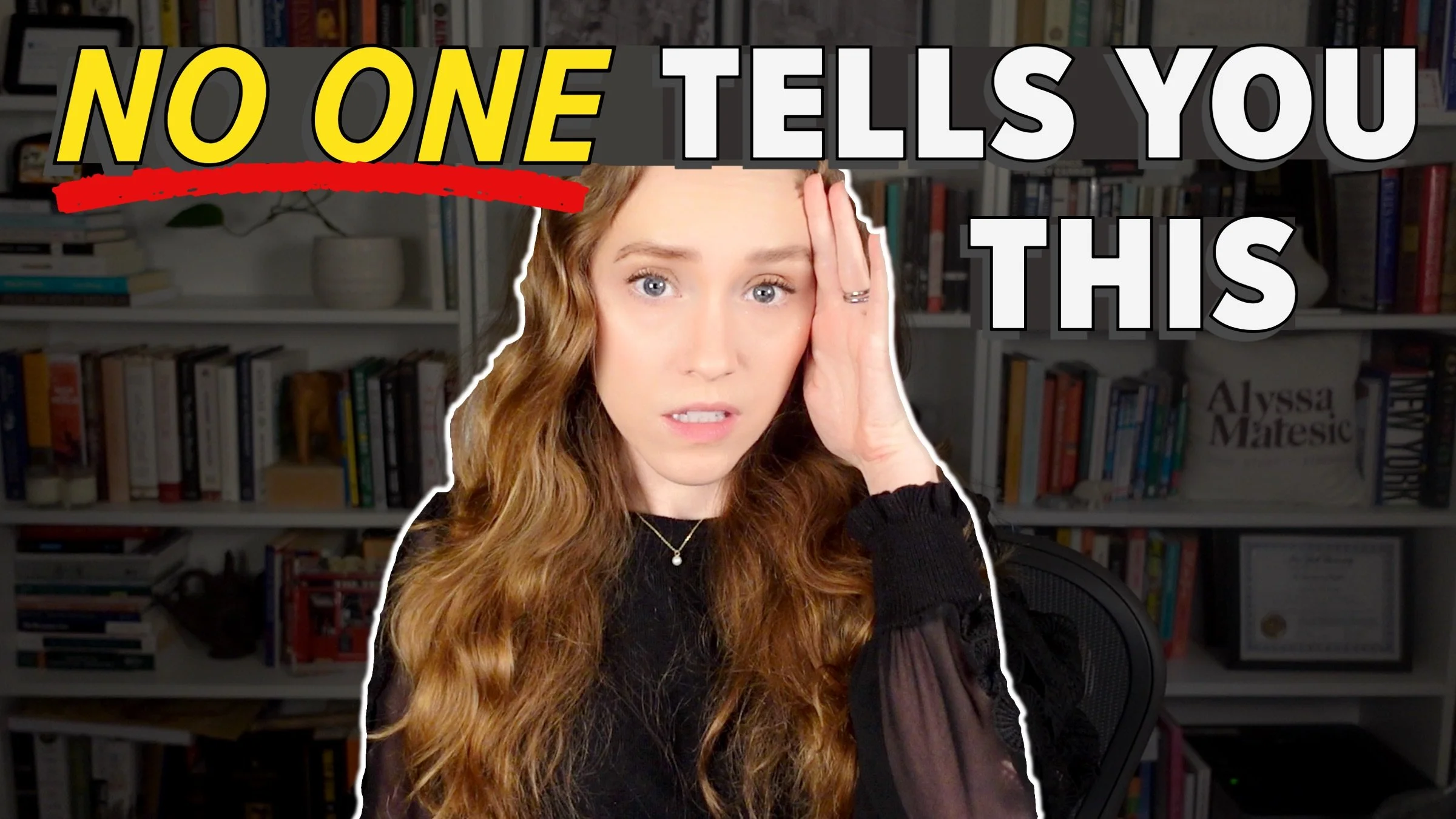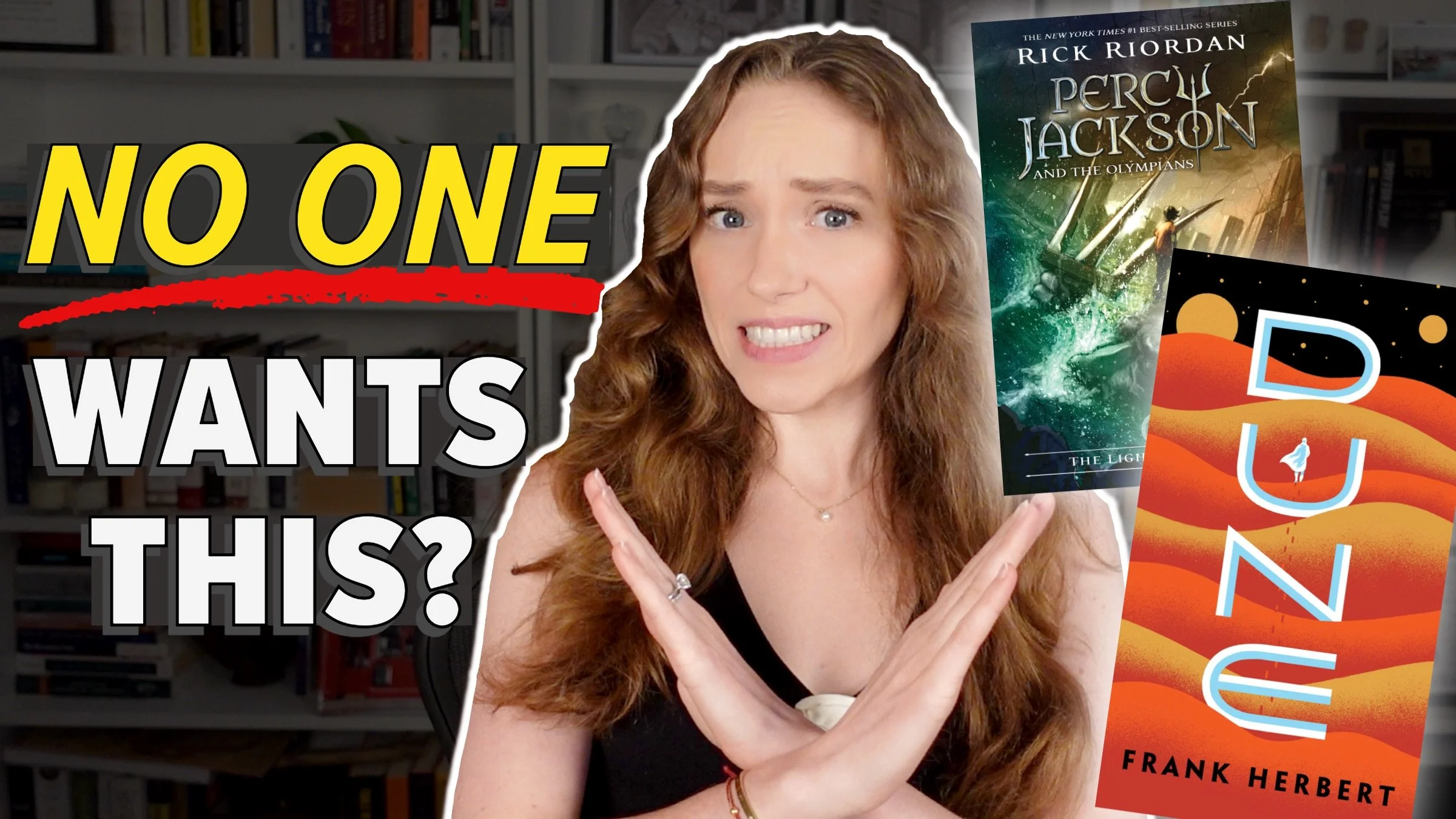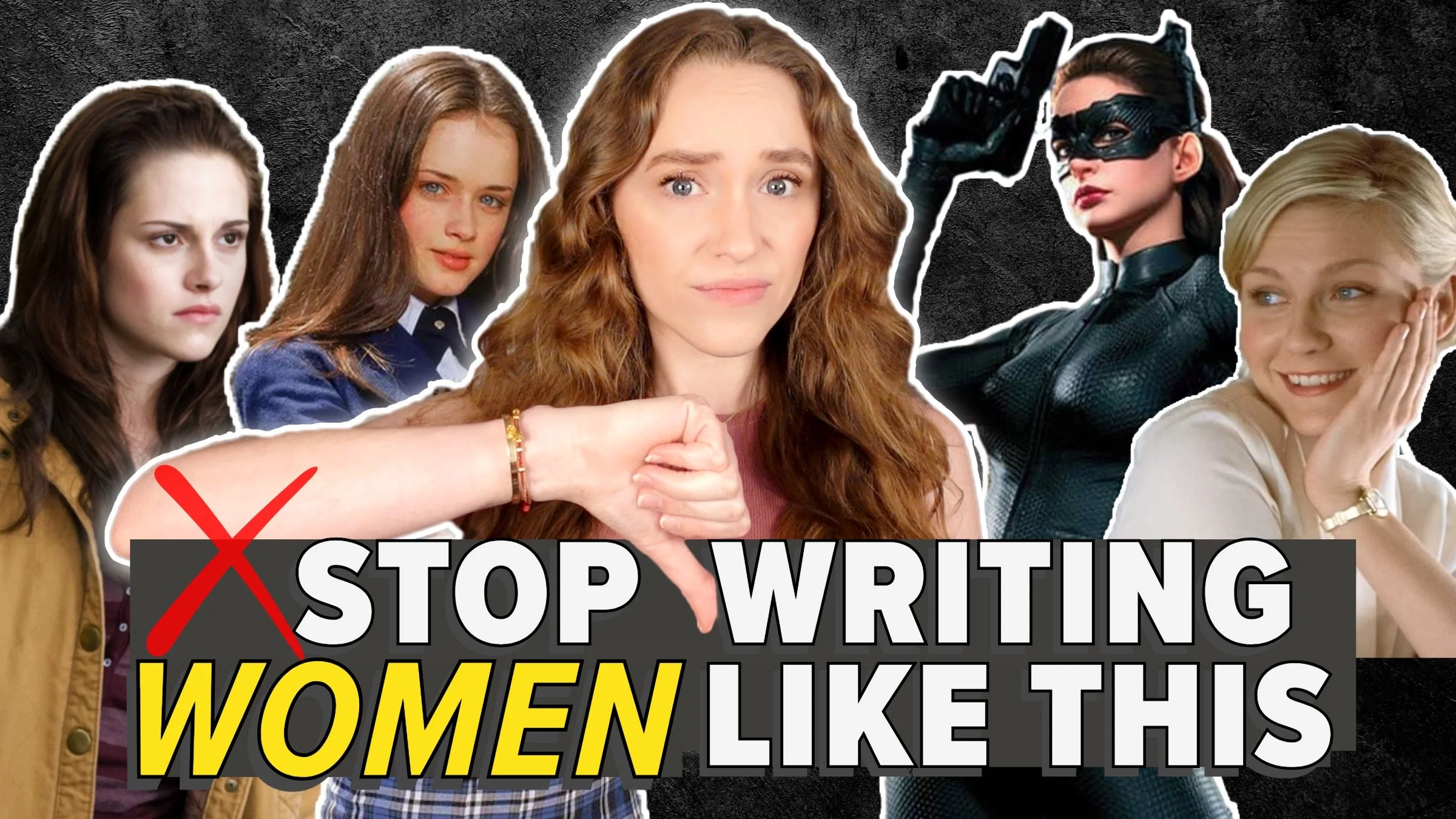Real Talk: Why Your Manuscript Is Being Rejected by Agents
HIT PLAY OR READ THE POST BELOW:
Authors who are currently querying literary agents are not okay. Here are some recent posts on Threads that prove as much:
“I love getting rejected by literary agents. I've given up on querying them. If I can't get an agent with three publishing offers on the table, what is the actual point of trying?”
“When I started querying agents, I didn't realize how long it would take for them to respond. Still stalking my inbox, waiting for feedback on those four full manuscript requests I received.”
“Nothing will make you question your talent more than sending your manuscript off to a bunch of industry professionals and waiting for them to tell you if you're good enough.”
I totally understand these feelings of frustration and discouragement. After all, you've poured your heart and soul into your book and finally feel ready to share it with agents, only for them to reject it or, worse, ghost you entirely. So what's the issue? Is it you? Is it the book? Is it the agent? It feels impossible to know.
So today I'm breaking down the real reasons why agents are saying no to your book. Some of these reasons might sting, but if it's your dream to get traditionally published, these reasons are important for you to know so you can ultimately fix your query, fix your manuscript, or fix your querying strategy, and improve your odds.
I recently stumbled across an article called "Why Agents Are Rejecting Your Work" and found it to be one of the most comprehensive discussions of agent rejections. So I'm going to use that to frame our conversation today. The post comes from the author Parker Pey House, who writes a newsletter entitled The Writer's Attic. She's written two sci-fi novels published by Torine and a novella collection published by Penguin. Before she was published, she queried extensively and ultimately signed with three different agents over her career.
I'm going to go through her post and then offer my two cents from my experience working in the publishing industry.
Failure to follow agent’s instructions
She starts with the most common and most frustrating situation that many of you are probably in right now.
If an agent has rejected or ignored your query letter, the problem might be your approach to querying. You might not have followed the agent’s instructions. Every agent has their own preferences for receiving query letters. If you don’t follow an agent’s specific instructions, your query might get deleted. Check each agent’s website for instructions before reaching out.
You’d be shocked how many authors simply don’t follow agents’ instructions — so don’t be one of them. I know it can be super annoying and tedious to have to tweak the subject line of your email query for each individual agent or include certain fields that they ask for, but take the time to do it. Some agents have email filters set up that will automatically delete emails that don’t follow specific instructions. Also, if an agent has a specific query inbox that is different from their main agency email, make sure to use their query email. If you try to bypass it and go directly to their main email address, it’s probably just going to get deleted. They divide their inboxes for a reason.
Poor agent selection
Now, the next issue could be in how you’re selecting agents to query — you didn’t query the right agent.
If an agent only represents adult romance novels and you queried for a children’s fantasy novel, you’re not going to get anywhere. I'll admit it's sometimes difficult to know exactly what each agent is looking for, though. Manuscript Wish List helps but is often out of date. An agent’s website or social media feed is usually more current.
QueryTracker will also note when agents have updated their preferred genres, so that’s another place to check. If they use a Query Manager form to accept queries, then you will only be able to query them if you’re writing in a genre they’re currently accepting. Agents might change what genres they’re open to at any particular moment, so if it’s been a while since you looked at that agent’s website or Query Manager page, do a double check before you send off your query to make sure you don’t get an instant rejection just based on genre.
Doesn’t fit the market
The next reason for rejecting a query is something I see all the time:
You might be writing something that doesn’t fit the market at all. Of course, you can be unique (trust me, I’ve published some weird stuff) but if the main character of your YA novel is thirty years old or your thriller is 150K words long, you’re not even close enough to the market to break in.
Go to a bookstore, find the place on the shelf where your novel would sit, and read a ton of novels on that same shelf to get a feel for what the market can allow. (You don’t need to emulate those books; you just need to understand the conventions.)
I've been seeing more and more authors reach out to me for editing with manuscripts that are wildly outside the standard range for their genre. This is more than likely going to lead to a quick rejection. If you feel strongly that your length is justified and the story needs to be that length, by all means proceed — but know that you're likely going to get many rejections based on the length alone. I also see authors sometimes try to hide their non-standard length by not mentioning it in the query letter. I don't recommend doing this. Agents will eventually see the word count when they request the full manuscript anyway, so you're just delaying the same concern they're going to have.
As for other genre standards — specifically when it comes to age ranges of characters for YA, middle-grade, and children's books — I love the suggestion to read widely in your genre before querying. That will give you a great sense of what's resonating with readers and what publishers — and therefore agents — are looking for.
Bad grammar
The good news is, all of the mistakes we've talked about so far can easily be fixed by doing your research on the agent and on the industry standards for your genre. So now let's talk about problems with your query letter that could be leading agents to reject you. Here's what Parker says about your query letter itself:
Your grammar is bad. Grammar mistakes have a way of being invisible. In fact, sometimes I’ll critique a manuscript for someone and point out an error only to see the error make it through to the next draft. And I would say that well over half the manuscripts I critique have enough grammar errors to give an agent pause. Grammar mistakes can make an agent worry that a writer isn’t professional enough to publish, and pervasively bad grammar can make an agent worry that a writer isn’t skilled enough to tell a good story.
Sometimes you just need a friend to proofread, but honestly, you can’t be a good writer if you’re really bad at grammar.
And then she goes on to recommend the resource Painless Grammar. I was admittedly surprised to see her spend so much time talking about grammatical issues in query letters because it's not necessarily the biggest issue I see in the query letters I edit personally. But I do agree that pervasive grammatical issues — especially those that get in the way of the readability of your writing — will likely lead to quick rejections by literary agents because they are looking for authors who have a strong command of writing.
If you struggle with the technical aspects of your writing, a book I recommend is Dreyer's English. The author was the copy chief of Random House when I was there, and I worked with him. He is amazing at making technical issues fun, enjoyable, and easy to understand.
Poor query structure
This next issue should be easy to avoid, yet I see so many authors do it:
You didn't follow the standard structure for a query letter. A query letter is supposed to introduce the main character, present their problem, and reveal the stakes of the story.
Sometimes authors will try out an experimental query letter format to catch an agent’s attention in a crowded inbox, but this approach is unlikely to get your desired outcome. Remember that agents are reviewing your query letter quite quickly, and they want to be able to easily find all the information they're looking for. So, if you bury it in a non-standard structure or omit it entirely, you're not doing yourself any favors.
Book description isn’t enticing
This next issue is what I think is the most common reason queries get rejected based on the query letter alone: your query reads well and has good structure, but it's not enticing:
Most query letters I critique are too vague on details, and the stakes aren’t spelled out clearly. Some are very flat, without any voice or style. Remember that the goal of your query letter is to get an agent to read your sample pages, which means your query’s story description needs to build to an intriguing climax. You might study successful query letters writers have posted online or pay for a critique. If you can find a message board or group that does mutual critiques for free, those can help as well.
Here's what the issue boils down to: you just aren't making your book sound all that interesting. Remember that the query letter has one job — make the agent so intrigued they have no choice but to read your sample pages. It's hard to know, though, if your query letter is landing the way you intend. So, if you haven't gotten feedback on your query letter, do it now. If you don't have a critique partner or the ability to pay a professional for a query letter critique, then at a minimum, ask your friend to read the description of your story in the query letter and be honest with you about whether they would want to read that book.
The description of your story in your query letter should ultimately sound like the jacket copy you see on the back cover of a book or on its online description page. So, read a bunch of those for books in your genre and then model yours after that. Again, it has the same goal — make someone want to read the book — so you'll be able to pick up on stylistic choices and structures that help you achieve that.
Familiar premise
This next issue is something you might see some agents allude to in their rejection: your premise seems too familiar.
If your query letter makes your rom com sound like every other rom com, or your mystery like every other mystery, either your query letter isn’t going into enough specifics or the premise of your novel needs a tweak.
If your YA dystopia sounds like a thinly veiled spin-off of The Hunger Games, then agents are going to pick up on that and probably won't want to read more. They're looking for originality — something they've never heard of before but are intrigued by. If you haven't found your book's unique hook yet, work on that now. Find the one aspect of your story that differentiates it from everything else out in the genre. Maybe that's the setting, maybe that's the protagonist, or maybe it's the structure of your book — then make sure to highlight that in your query letter description.
Too similar to a book already represented
This last query-letter-related issue is something that you ultimately can't control but should still be aware of:
Your story is too much like one the agent already represents. You’re probably querying agents who represent novels similar to yours—which is a great idea, because these agents are obviously interested in the kind of thing you’re writing. But an agent has to make sure she isn’t putting her clients into competition with one another. She can’t send two romantasy novels about dragon-riders to editors. That doesn’t mean an agent won’t take on more than one romantasy novel at a time, though, so don’t despair. Yours just needs to be different enough not to compete directly with an existing client’s work.
Keep querying other agents.
Parker's description of the issue here is spot-on. Agents are looking for stories that are still within their taste and interest area but are different enough from what their other clients are doing. After all, they don't want to create competition for their own clients, because that doesn't help anyone get a book deal. Agents keep their clients' projects confidential, so you ultimately won't have any way of knowing what an agent's clients are working on at any given moment. This issue is out of your control, so all you can do is shoot your shot with the agent who seems like the best match on paper.
Bad writing
If you sent sample pages along with your query letter and received a rejection — or if you didn't get any response — the problem might be one listed above, or the problem might be your sentence-level writing. Parker says:
Your style is bad. Your sentences might be technically correct, but if they lack style, your story won’t be interesting to read.
The best way to develop good style is to read a lot, and to write a lot. But I also very much recommend Self-Editing for Fiction Writers.
I don't personally know that specific resource, but I totally agree that reading widely is the best way to improve your craft and develop your voice. Don’t just read canonical authors — also read contemporary authors who are publishing today in your genre.
Many authors I work with ask me if their writing is definitively good or bad, which is admittedly a very difficult question to answer. After all, remember this industry is subjective. Writing that sounds too bland or too flowery to one agent or reader might sound great to another. Agents won't typically tell you your writing is bad outright, partly because they don't want to hurt your feelings, but also partly because it's so subjective. So, the best thing you can do is continually work to improve your craft.
Your protagonist isn’t compelling
This next issue with sample pages is something I see all the time: your story's appeal.
The most important thing the beginning of a story can do, other than to establish your premise, is to make your main character sympathetic and compelling. It wasn’t until I spent a ton of time working on this skill that I finally got an agent and a publishing deal.
No matter how compelling your plot or setting is, if your main character isn't someone we're interested in, we're unlikely to keep reading. That doesn't mean your protagonist has to be likable, but they do need to be someone we care about to some degree. So, make sure you're doing enough character work to make them well-developed in your opening pages.
Boring first scene
This next issue has to do with where you start your story:
If you have a great introduction to a main character, you probably don’t need much else, but making sure your first scene is well-crafted can help. Your first chapter should be almost a story in itself, with a captivating build toward a reversal.
A large percentage of authors I work with start their novels in the wrong place. Most often, they start way too early, with a bunch of lead-up material that doesn't contain conflict or build effectively toward the inciting incident. But sometimes they go too far in the other direction and start too late, throwing us directly into drama that we don't care about because we don't know enough about the protagonist yet. You need to hit that Goldilocks sweet spot. If you're at all questioning whether you're starting your novel in the right place, I challenge you to cut the first scene and start with the second. What happens to the pacing when you start deeper in the story?
Unclear premise
Finally, the last reason for a rejection based on your sample pages has to do with narrative momentum: your premise isn't clear.
If your main character and your opening scene feel like every other character and plot, your book will seem like a hard sell. The same is true if your opening pages are just plain confusing.
You might need a good critique to improve on this issue.
If the agent has no idea what the plot is building to or what the main conflict of your story will entail based on your sample pages, they won't want to read more. These pages need to have a strong sense of direction, focus, and momentum to propel us into the rest of the story. Just like a good query letter should give the agent no choice but to dive into the sample pages, strong sample pages should give the agent no choice but to request the full manuscript. So, do you establish a compelling source of conflict that we want to see play out? Do you leave us wanting more?






